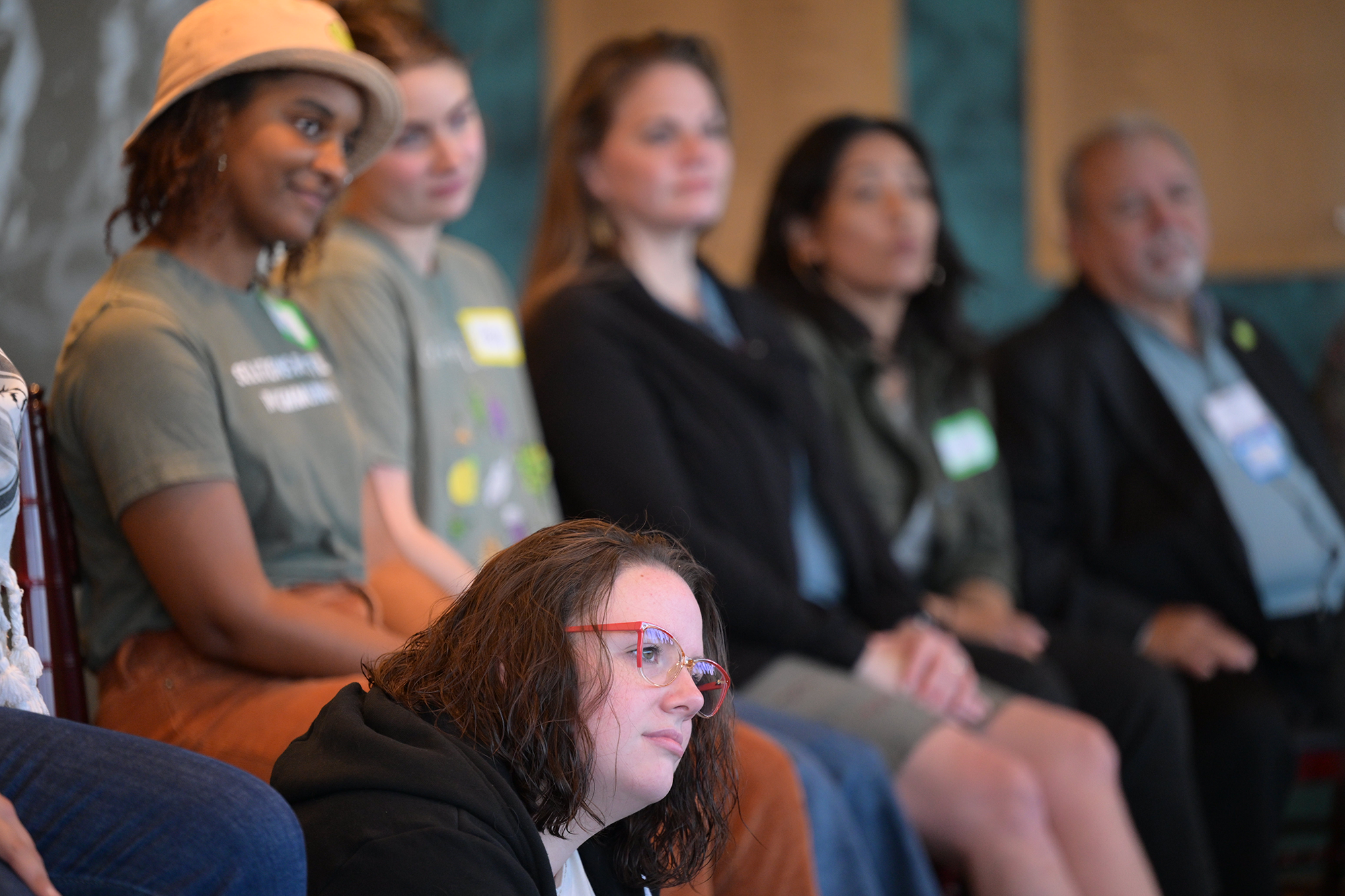
In this week’s Principle 6 Newsletter, guest author Martin Lowery points out that democratic participation in a cooperative is an ideal way for people to develop the skills they need to be engaged, impactful citizens.
Lowery, executive vice president, emeritus of the National Rural Electric Cooperative Association (NRECA), is chair of the International Cooperative Alliance (ICA)’s Identity Committee, where he explores how embracing the cooperative identity and values can help tackle some of today’s most pressing challenges.
“Imagine the day that cooperatives are viewed as the best teachers of democratic principles and practices in their communities, the best teachers of civics and civic responsibility, leading by example,” Lowery writes.
While you’re thinking about how co-ops can work together across sectors to build democracy, take a moment to consider how you and your cooperative practice “cooperation among cooperatives.” NCBA CLUSA is on a mission to document Principle 6 collaborations across the country so we can identify trends, document best practices and share this knowledge with you—our fellow cooperators!
Share your example of Principle 6
Principle 6 Newsletter – Democracy and Cooperative Identity
January 26, 2022
I was brought up in my father’s house to believe in democracy. “Trust the people.” That was his message. – Winston Churchill, “Never Give In!” Winston Churchill’s Greatest Speeches
Popular elections in and of themselves do not a democracy make. Free and open discussion, deliberation, and consultation are essential preconditions to elections as democratic elements. – Sidney Pobihushchy, “The Co-operative Values: Their Meaning and Practical Significance,” 2002
The cooperative tradition of democratic participation in the workplace enables individuals to develop the skills and confidence for participation in their communities and societies. – Carole Pateman, “Participation and Democratic Theory,” Cambridge University Press, 1970
 Last December The Atlantic ran a cover story by staff writer Anne Applebaum entitled “The Bad Guys Are Winning—How a New League of Autocrats is Outsmarting the West.” The article is one of many recent commentaries that wonder aloud about the future of democratic governance and democracy.
Last December The Atlantic ran a cover story by staff writer Anne Applebaum entitled “The Bad Guys Are Winning—How a New League of Autocrats is Outsmarting the West.” The article is one of many recent commentaries that wonder aloud about the future of democratic governance and democracy.
An important theme woven through many of these commentaries is the concern that citizens are no longer educated on the why’s and how’s of civic participation. One would be hard-pressed to find a civics class today at the elementary or secondary school level. Perhaps a college graduate will have engaged in discussions around the dynamics of effective democratic institutions, but not necessarily.
Former World Chess Champion Garry Kasparov recently pronounced that “Our generation will either renew democracy or lose it forever.” If renewal is indeed needed, it is unlikely to happen if citizens and communities do not see themselves as important voices in democratic processes or, even worse, do not see the relevance of democracy in their lives.
What role might cooperatives play in this conversation? After all, democracy is one of the six cooperative values that are essential to cooperative identity, along with self-help, self-responsibility, equality, equity and solidarity.
How should we interpret the cooperative value of democracy? Should it be viewed as the centerpiece, the core of the values shared by all cooperatives? Or is it simply one among the six values? Can democracy as a cooperative value fill a gap in a community’s understanding of the importance of civic participation? Can it be useful in demonstrating that inclusivity will most likely achieve the best result in collaborative decision-making?
To answer these questions, it may be worthwhile to explore the suggestion of Carole Pateman, quoted above, that democratic participation in a cooperative is an excellent way for people to develop the skills needed to be effective and impactful citizens in their communities.
Democratic participation in a cooperative is an excellent way for people to develop the skills needed to be effective and impactful citizens in their communities.
Sara Horowitz, founder of the Freelancers Union, speaking at the 2021 Cooperative IMPACT Conference, certainly sees it that way. She believes that democracy as a cooperative value is the central driver of cooperative success and that the Rochdale Principles are a “how to” on democratic processes.
Let us imagine for a moment a future time when every cooperative adopts as its top priority the challenge of building an educated membership that believes in and values their democratic rights. Is this a pipe dream? Not if we accept the idea that democracy is the central driver of cooperative success, that regardless of what type of cooperative you represent, your success will be fully dependent on your willingness to engage your members.
A very important consideration applies here, as described by the late Professor Pobihushchy, quoted above. He believed that the democracy value fundamentally requires a reciprocal relationship between the cooperative member and the cooperative itself. He described it this way—cooperative members have an obligation to keep themselves informed and are entitled to have their voices heard. In turn, the cooperative must draw upon the collective wisdom of those members both procedurally (voting, for example) and substantively (seeking ideas from the people).
This is easier said than done. It requires that the cooperative’s board and management are willing to focus attention on living the democracy value as the highest priority from a mission and purpose perspective. It also requires that the individual cooperative members take seriously their responsibility to actively participate in the cooperative.
First and foremost, to achieve the objective of making democratic participation the highest priority, every cooperative needs a first-rate member education program that respects the principle of one-member, one-vote, that encourages innovative ideas and that is purposefully focused on inclusivity. Every member’s vote counts, and every member’s voice counts.
So far, so good. But around the corner comes a very big challenge from the University of Bologna’s Stefano Zamagni, a professor who has incorporated the cooperative business model into his teaching and who considers it to be a superior model for business transactions and social transformation.
In a panel discussion during the 2021 Cooperative IMPACT Conference, he suggested that the democracy value may be the “Achilles heel” of cooperatives, arguing that if a cooperative allows a majority of its membership to silence minority viewpoints, the cooperative will fail over time.
If cooperative members who represent a minority viewpoint are never acknowledged, there will come a time when they will find another outlet to express their interests.
This is all about reciprocity and trust, and Pobihushchy and Zamagni speak from experience. If cooperative members who represent a minority viewpoint are never acknowledged, there will come a time when they will find another outlet to express their interests. If people are not given the opportunity to be heard, if free and open discussion is not encouraged, then the belief in cooperative democracy will be diminished; and ultimately the cooperative itself will face the risk of dissolution.
This exactly describes the recent fate in 2020 of Canada’s Mountain Equipment Cooperative, now owned by a private investment firm. The reaction from a Toronto writer—“Sad. Lost their co-op roots somewhere along the way. Became a corporate run big box that chased something else.”
The democratic path is not the easiest path, but it is the most sustainable path to equality and fairness in the long term. Minority viewpoints must be respected. Compromise is essential. Finding the common ground is essential. Inclusion is essential.
Imagine the day that cooperatives are viewed as the best teachers of democratic principles and practices in their communities, the best teachers of civics and civic responsibility, leading by example. Might we as a result see a renaissance of interest in inclusive democratic processes in local communities, regionally, nationally and ultimately around the globe?
Quite possibly so.
Stay tuned,
Martin


